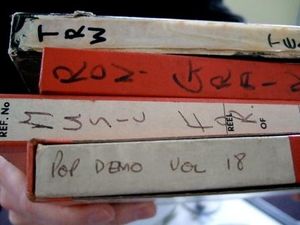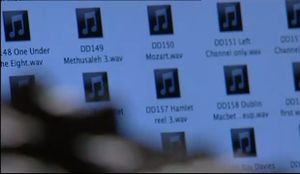Difference between revisions of "Attic Tapes"
Martinwguy (talk | contribs) (→Availability) |
Martinwguy (talk | contribs) (→Contents) |
||
| (4 intermediate revisions by the same user not shown) | |||
| Line 32: | Line 32: | ||
In March 2008<ref>BBC article [http://news.bbc.co.uk/2/hi/entertainment/7512072.stm Lost tapes of the Dr Who composer], 18th July 2008</ref> Mark gave them on permanent loan to Manchester University in the care of Dr [[David Butler]]. | In March 2008<ref>BBC article [http://news.bbc.co.uk/2/hi/entertainment/7512072.stm Lost tapes of the Dr Who composer], 18th July 2008</ref> Mark gave them on permanent loan to Manchester University in the care of Dr [[David Butler]]. | ||
| + | {{Thumb|Attic tapes folder}} | ||
They were almost all digitized by [[Louis Niebur]] and [[David Butler]]<ref>In ''[[Delia Derbyshire's Creative Process]]'', p.11, James Percival attributes the digitization to Mark Ayres and Louis Niebur, but without giving a source for the claim.</ref> in the summer of 2007<ref>[https://web.archive.org/web/20100630231421/http://www.novars.manchester.ac.uk/research/delia/index.html The web page for the first Delian presentation on novars.manchester.ac.uk].</ref> by playing them on a 1960s Studer A80 tape machine lent by the BBC's Manchester studios.<ref>http://philosophyofscienceportal.blogspot.it/2008/07/delia-derbyshire-revival-for-dr-who.html</ref> | They were almost all digitized by [[Louis Niebur]] and [[David Butler]]<ref>In ''[[Delia Derbyshire's Creative Process]]'', p.11, James Percival attributes the digitization to Mark Ayres and Louis Niebur, but without giving a source for the claim.</ref> in the summer of 2007<ref>[https://web.archive.org/web/20100630231421/http://www.novars.manchester.ac.uk/research/delia/index.html The web page for the first Delian presentation on novars.manchester.ac.uk].</ref> by playing them on a 1960s Studer A80 tape machine lent by the BBC's Manchester studios.<ref>http://philosophyofscienceportal.blogspot.it/2008/07/delia-derbyshire-revival-for-dr-who.html</ref> | ||
| − | They contain the audio for dozens of pieces of Delia's music that were believed lost, including at least one [[Macbeth]]<ref>Heard by [[Martin Guy]] during a personal visit to Manchester in 2010.</ref>, the medleys she made for the [[ICI Fashion Show]] and the [[Brighton Festival]]<ref>[http://researchnovars.blogspot.com/2009/04/to-independent-listener-delia.html]</ref>, [[Le Pont Mirabeau]]<ref>Message from [[James Percival]] in the Delia Derbshire mailing list.</ref>, for [[Hamlet]], [[Medea]] and [[Raven and Dove]]<ref>[http://www.novars.manchester.ac.uk/research/delia/english_html/img11.html Slide 11 of 2007 presentation ''The Delia Derbyshire Archive'' at Manchester University]</ref> | + | They contain the audio for dozens of pieces of Delia's music that were believed lost, including at least one [[Macbeth]]<ref>Heard by [[Martin Guy]] during a personal visit to Manchester in 2010.</ref>, the medleys she made for the [[ICI Fashion Show]] and the [[Brighton Festival]]<ref>[http://researchnovars.blogspot.com/2009/04/to-independent-listener-delia.html]</ref>, [[Le Pont Mirabeau]]<ref>Message from [[James Percival]] in the Delia Derbshire mailing list.</ref>, for [[Hamlet]], [[Medea]] and [[Raven and Dove]],<ref>[http://www.novars.manchester.ac.uk/research/delia/english_html/img11.html Slide 11 of 2007 presentation ''The Delia Derbyshire Archive'' at Manchester University]</ref> as well as [[Lowell]]<ref>[[DD045]]: Lowell</ref> but in the years since they were digitized, nothing has been published. |
=Contents= | =Contents= | ||
| − | There are | + | There are three catalogues of the tapes: |
* Mark Ayres' [[Initial Catalogue]] numbers them DD123 and records the labels on them and gives a brief description of each. There is a summary on the page [[DD]]. | * Mark Ayres' [[Initial Catalogue]] numbers them DD123 and records the labels on them and gives a brief description of each. There is a summary on the page [[DD]]. | ||
| − | * The [http://archives.li.man.ac.uk/ead/html/gb133dda-p6.shtml#id3936767 John Rylands Library | + | * Louis Niebur's ''[[DD Audio Files Commentary]] gives more detail about each tape's contents. |
| + | * James Percival's thesis ''[[Delia Derbyshire's Creative Process]]'' catalogues each tape as CDD/1/2/3 and so on and describes their contents in even more detail. The correspondence between the DD123 and CDD/1/2/3 numbering schemes is on the page [[DD]]. | ||
| + | * The [http://archives.li.man.ac.uk/ead/html/gb133dda-p6.shtml#id3936767 catalogue of the John Rylands Library], where the tapes are held, says "This material is currently uncatalogued. A provisional list may be viewed in person at the Library". | ||
<!-- | <!-- | ||
{| border=1 cellspacing=0 cellpadding=4 | {| border=1 cellspacing=0 cellpadding=4 | ||
| Line 83: | Line 86: | ||
=Availability= | =Availability= | ||
* From 2008 to 2016 you had to go and sit in David Butler's office while he played them to you on his laptop. | * From 2008 to 2016 you had to go and sit in David Butler's office while he played them to you on his laptop. | ||
| − | * In early 2014, the university was given money to set up listening stations in the university library.<ref>[[David Butler]] in [https://deliaderbyshireday.wordpress.com/2014/03/24/dd-day-2014-trailer-latest-news-about-the-delia-derbyshire-archive/ the pre-Delia Derbyshire Day 2014 interview]</ref> They eventually appeared in early 2016. Anyone over the age of 18<ref>[http://www.library.manchester.ac.uk/special-collections/using-the-special-collections/ John Rylands Library: ''Using the Special Collections'']</ref> should now be able to listen to them by going in person to the [http://www.library.manchester.ac.uk/special-collections/ John Rylands Library] at the University of Manchester | + | * In early 2014, the university was given money to set up listening stations in the university library.<ref>[[David Butler]] in [https://deliaderbyshireday.wordpress.com/2014/03/24/dd-day-2014-trailer-latest-news-about-the-delia-derbyshire-archive/ the pre-Delia Derbyshire Day 2014 interview]</ref> They eventually appeared in early 2016. Anyone over the age of 18<ref>[http://www.library.manchester.ac.uk/special-collections/using-the-special-collections/ John Rylands Library: ''Using the Special Collections'']</ref> should now be able to listen to them by going in person to the [http://www.library.manchester.ac.uk/special-collections/ John Rylands Library] at the University of Manchester.<ref>[https://rylandscollections.wordpress.com/2016/02/16/listening-to-the-delia-derbyshire-archive/ ''Listening to the Delia Derbyshire Archive''] on the John Rylands Library Special Collections Blog.</ref> |
=References= | =References= | ||
<references/> | <references/> | ||
Latest revision as of 14:43, 12 May 2020
Her long-term partner Clive Blackburn says:
"After Delia's death [...] I cleared the house and removed all of the tapes from the attic, then drove down to London and handed them over to Brian, together with all of the papers I had found which were related to her music. Brian then passed all of this on to Mark Ayres, the Radiophonic Workshop archivist."[1]
and Mark Ayres says:
“When Delia died, her partner Clive discovered all these boxes in her attic, just numbers of tea chests and cardboard boxes all falling to bits, all full of tapes which one day had sticky labels on them but all the sticky labels had fallen off and were at the bottom of the boxes so we were just left with hundreds of reels of tapes and the labels, so it was a real jigsaw puzzle.
Initially Brian Hodgson took delivery of the tapes [...] and he weeded out a lot of stuff because, basically, Delia seemed to have, when she left the BBC, just emptied her studio into the back of a car so a lot of them were either blank tapes or just echo tapes and just bits of edits which weren't going anywhere or duplicates of things we already had. So Brian did an initial sort of weed through but I still ended up with about 300 reels of tapes.” [2][3]
while Breege Brennan summarises:
“When Derbyshire left the BBC in 1973, she emptied boxes of papers and tapes from her office into her car. They remained untouched in her attic. ... Following her death, Brian Hodgson suggested to Clive Blackburn, Derbyshire's partner, that Ayres be appointed to catalogue the almost 300 tapes.
Ayres returned to the Radiophonic Workshop Archive anything that belonged to it. However, that was just the beginning of a long, unfinished process. The problem was two-fold. On any one tape, there were pieces from separate, and usually different projects. Secondly, the tapes were improperly stored, and the sticky labels fell off. So any one box could have 30 tapes and hundreds of labels in the bottom of the box. There were nearly 300 tapes and the cataloguing alone would take at least six months.”[4]
In March 2008[5] Mark gave them on permanent loan to Manchester University in the care of Dr David Butler.
They were almost all digitized by Louis Niebur and David Butler[6] in the summer of 2007[7] by playing them on a 1960s Studer A80 tape machine lent by the BBC's Manchester studios.[8]
They contain the audio for dozens of pieces of Delia's music that were believed lost, including at least one Macbeth[9], the medleys she made for the ICI Fashion Show and the Brighton Festival[10], Le Pont Mirabeau[11], for Hamlet, Medea and Raven and Dove,[12] as well as Lowell[13] but in the years since they were digitized, nothing has been published.
Contents
Contents
There are three catalogues of the tapes:
- Mark Ayres' Initial Catalogue numbers them DD123 and records the labels on them and gives a brief description of each. There is a summary on the page DD.
- Louis Niebur's DD Audio Files Commentary gives more detail about each tape's contents.
- James Percival's thesis Delia Derbyshire's Creative Process catalogues each tape as CDD/1/2/3 and so on and describes their contents in even more detail. The correspondence between the DD123 and CDD/1/2/3 numbering schemes is on the page DD.
- The catalogue of the John Rylands Library, where the tapes are held, says "This material is currently uncatalogued. A provisional list may be viewed in person at the Library".
See also
There are hundreds more tapes of unpublished Delian work at the BBC, listed here on page TRW.
Availability
- From 2008 to 2016 you had to go and sit in David Butler's office while he played them to you on his laptop.
- In early 2014, the university was given money to set up listening stations in the university library.[14] They eventually appeared in early 2016. Anyone over the age of 18[15] should now be able to listen to them by going in person to the John Rylands Library at the University of Manchester.[16]
References
- ↑ Comment on facebook.com
- ↑ Mark Ayres speaking in the Sculptress of Sound BBC TV programme.
- ↑ Mark speaks again about the Attic Tapes in an interview made for These Hopeful Machines.
- ↑ Breege Brennan's thesis
- ↑ BBC article Lost tapes of the Dr Who composer, 18th July 2008
- ↑ In Delia Derbyshire's Creative Process, p.11, James Percival attributes the digitization to Mark Ayres and Louis Niebur, but without giving a source for the claim.
- ↑ The web page for the first Delian presentation on novars.manchester.ac.uk.
- ↑ http://philosophyofscienceportal.blogspot.it/2008/07/delia-derbyshire-revival-for-dr-who.html
- ↑ Heard by Martin Guy during a personal visit to Manchester in 2010.
- ↑ [1]
- ↑ Message from James Percival in the Delia Derbshire mailing list.
- ↑ Slide 11 of 2007 presentation The Delia Derbyshire Archive at Manchester University
- ↑ DD045: Lowell
- ↑ David Butler in the pre-Delia Derbyshire Day 2014 interview
- ↑ John Rylands Library: Using the Special Collections
- ↑ Listening to the Delia Derbyshire Archive on the John Rylands Library Special Collections Blog.

